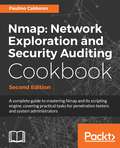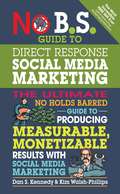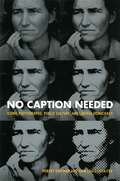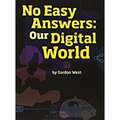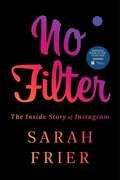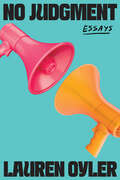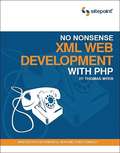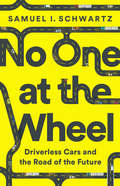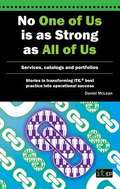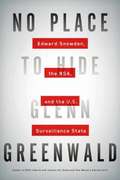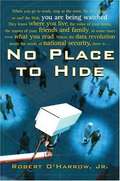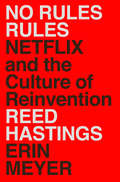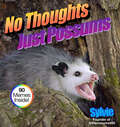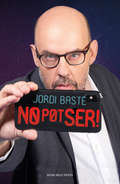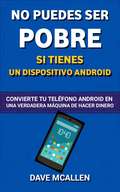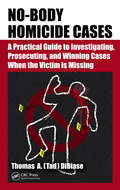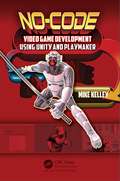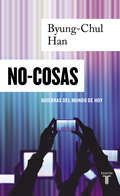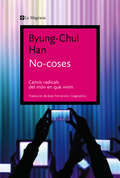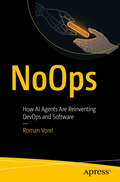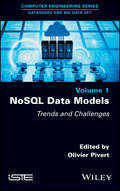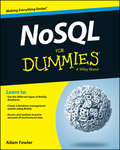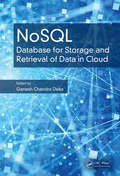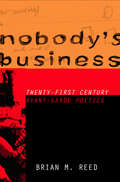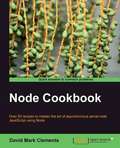- Table View
- List View
Nmap: Network Exploration and Security Auditing Cookbook - Second Edition
by Paulino CalderonOver 100 practical recipes related to network and application security auditing using the powerful Nmap About This Book • Learn through practical recipes how to use Nmap for a wide range of tasks for system administrators and penetration testers. • Learn the latest and most useful features of Nmap and the Nmap Scripting Engine. • Learn to audit the security of networks, web applications, databases, mail servers, Microsoft Windows servers/workstations and even ICS systems. • Learn to develop your own modules for the Nmap Scripting Engine. • Become familiar with Lua programming. • 100% practical tasks, relevant and explained step-by-step with exact commands and optional arguments description Who This Book Is For The book is for anyone who wants to master Nmap and its scripting engine to perform real life security auditing checks for system administrators and penetration testers. This book is also recommended to anyone looking to learn about network security auditing. Finally, novice Nmap users will also learn a lot from this book as it covers several advanced internal aspects of Nmap and related tools. What You Will Learn • Learn about Nmap and related tools, such as Ncat, Ncrack, Ndiff, Zenmap and the Nmap Scripting Engine • Master basic and advanced techniques to perform port scanning and host discovery • Detect insecure configurations and vulnerabilities in web servers, databases, and mail servers • Learn how to detect insecure Microsoft Windows workstations and scan networks using the Active Directory technology • Learn how to safely identify and scan critical ICS/SCADA systems • Learn how to optimize the performance and behavior of your scans • Learn about advanced reporting • Learn the fundamentals of Lua programming • Become familiar with the development libraries shipped with the NSE • Write your own Nmap Scripting Engine scripts In Detail This is the second edition of 'Nmap 6: Network Exploration and Security Auditing Cookbook'. A book aimed for anyone who wants to master Nmap and its scripting engine through practical tasks for system administrators and penetration testers. Besides introducing the most powerful features of Nmap and related tools, common security auditing tasks for local and remote networks, web applications, databases, mail servers, Microsoft Windows machines and even ICS SCADA systems are explained step by step with exact commands and argument explanations. The book starts with the basic usage of Nmap and related tools like Ncat, Ncrack, Ndiff and Zenmap. The Nmap Scripting Engine is thoroughly covered through security checks used commonly in real-life scenarios applied for different types of systems. New chapters for Microsoft Windows and ICS SCADA systems were added and every recipe was revised. This edition reflects the latest updates and hottest additions to the Nmap project to date. The book will also introduce you to Lua programming and NSE script development allowing you to extend further the power of Nmap. Style and approach This book consists of practical recipes on network exploration and security auditing techniques, enabling you to get hands-on experience through real life scenarios.
No B.S. Guide to Direct Response Social Media Marketing: The Ultimate No Holds Barred Guide to Producing Measurable, Monetizable Results with Social Media Marketing
by Dan S. Kennedy Kim Walsh-PhillipsTo avoid grabbing every business owner he meets by the shoulders and shaking them, millionaire maker Dan S. Kennedy has joined with marketing strategist Kim Walsh-Phillips to help business owners, private practice professionals, and professional marketers start making dollars and cents of their social media marketing. Daring readers to stop accepting non-monetizable "likes” and "shares” for their investment of time, money, and energy, Kennedy and Walsh-Phillips urge readers to see their social platforms for what they are--another channel to reach customers and gain leads and sales for their efforts. Illustrated by case studies and examples, this No B. S. guide delivers practical strategies for applying the same direct- response marketing rules Kennedy has himself found effective in all other mediums. Covers: *How to stop being a wimp and make the switch from a passive content presence into an active conversion tool *How to become a lead magnet by setting up social media profiles that focus on the needs of ideal prospects (not the product or service) *Creating raving fans that create introductions to their networks *How to move cold social media traffic into customers *The role of paid media and how to leverage social media advertising to drive sales
No Caption Needed: Iconic Photographs, Public Culture, and Liberal Democracy
by Robert Hariman John Louis LucaitesThe gaunt woman, her face lined with care, stares past the camera while three children cling to her amidst the Great Depression. A soldier catches a nurse in a powerful embrace on VJ Day in Times Square as onlookers smile approvingly. A naked Vietnamese girl runs in terror from the napalm attack engulfing the road behind her. Plumes of smoke streak outward in silent array as the Challenger explodes in the blue air over Florida. A solitary Chinese man stands calmly before the barrel of a tank at Tiananmen Square.
No Easy Answers: Our Digital World
by Gordon WestNo Easy Answers: Our Digital World describes Life in the Digital Age and answers the following questions: Are smartphones making us less smart? Are streaming services bad news for musical artists? Does modern technology enhance family life? Are driverless cars really an improvement over cars with human drivers? Is social media destroying our social skills? and Are video games bad for you?
No Filter: The Inside Story of Instagram
by Sarah FrierWinner of the 2020 Financial Times and McKinsey Business Book of the Year Award * Finalist for SABEW'S Inaugural Best in Business Book Award In this &“sequel to The Social Network&” (The New York Times), award-winning reporter Sarah Frier reveals the never-before-told story of how Instagram became the most culturally defining app of the decade.&“The most enrapturing book about Silicon Valley drama since Hatching Twitter&” (Fortune), No Filter &“pairs phenomenal in-depth reporting with explosive storytelling that gets to the heart of how Instagram has shaped our lives, whether you use the app or not&” (The New York Times). In 2010, Kevin Systrom and Mike Krieger released a photo-sharing app called Instagram, with one simple but irresistible feature: it would make anything you captured look more beautiful. The cofounders cultivated a community of photographers and artisans around the app, and it quickly went mainstream. In less than two years, it caught Facebook&’s attention: Mark Zuckerberg bought the company for a historic $1 billion when Instagram had only thirteen employees. That might have been the end of a classic success story. But the cofounders stayed on, trying to maintain Instagram&’s beauty, brand, and cachet, considering their app a separate company within the social networking giant. They urged their employees to make changes only when necessary, resisting Facebook&’s grow-at-all-costs philosophy in favor of a strategy that highlighted creativity and celebrity. Just as Instagram was about to reach a billion users, Facebook&’s CEO Mark Zuckerberg—once supportive of the founders&’ autonomy—began to feel threatened by Instagram&’s success. Frier draws on unprecedented access—from the founders of Instagram, as well as employees, executives, and competitors; Anna Wintour of Vogue; Kris Jenner of the Kardashian-Jenner empire; and a plethora of influencers worldwide—to show how Instagram has fundamentally changed the way we show, eat, travel, and communicate, all while fighting to preserve the values which contributed to the company&’s success. &“Deeply reported and beautifully written&” (Nick Bilton, Vanity Fair), No Filter examines how Instagram&’s dominance acts as lens into our society today, highlighting our fraught relationship with technology, our desire for perfection, and the battle within tech for its most valuable commodity: our attention.
No Judgment: Essays
by Lauren Oyler"The essay collection everyone’s talking about."—New YorkA MOST ANTICIPATED BOOK OF 2024: Elle, The Millions, LitHub, Nylon, BookPage, PureWow, and moreFrom the national bestselling novelist and essayist, a groundbreaking collection of brand-new pieces about the role of cultural criticism in our ever-changing world.In her writing for Harper’s, the London Review of Books, The New Yorker, and elsewhere, Lauren Oyler has emerged as one of the most trenchant and influential critics of her generation, a talent whose judgments on works of literature—whether celebratory or scarily harsh—have become notorious. But what is the significance of being a critic and consumer of media in today’s fraught environment? How do we understand ourselves, and each other, as space between the individual and the world seems to get smaller and smaller, and our opinions on books and movies seem to represent something essential about our souls? And to put it bluntly, why should you care what she—or anyone—thinks?In this, her first collection of essays, Oyler writes with about topics like the role of gossip in our exponentially communicative society, the rise and proliferation of autofiction, why we’re all so “vulnerable” these days, and her own anxiety. In her singular prose—sharp yet addictive, expansive yet personal—she encapsulates the world we live and think in with precision and care, delivering a work of cultural criticism as only she can.Bringing to mind the works of such iconic writers as Susan Sontag, Pauline Kael, and Terry Castle, No Judgment is a testament to Lauren Oyler’s inimitable wit and her quest to understand how we shape the world through culture. It is a sparkling nonfiction debut from one of today’s most inventive thinkers.
No Nonsense XML Web Development With PHP
by Thomas M. MyersA practical and concise book that teaches XML from the ground up. This tutorial style presents various XML methodologies and techniques in an easy to understand way, building a basis for further exploration. XML is essentially an enabling technology, dry and boring on its own. As a result, most books on the market are dry, and academic in nature teaching theory rather than practice. This book actually teaches practical, real-world applications of XML, using the very latest version of PHP (PHP 5) as the base language. No Nonsense XML Web Development with PHP explains how XML can be put to use in real-world projects. The book also covers buzz topics such as RSS and Web Services.
No One at the Wheel: Driverless Cars and the Road of the Future
by Karen Kelly Samuel I. SchwartzThe country's leading transport expert describes how the driverless vehicle revolution will transform highways, cities, workplaces and laws not just here, but across the globe. Our time at the wheel is done. Driving will become illegal, as human drivers will be demonstrably more dangerous than cars that pilot themselves. Is this an impossible future, or a revolution just around the corner?Sam Schwartz, America's most celebrated transportation guru, describes in this book the revolution in self-driving cars. The ramifications will be dramatic, and the transition will be far from seamless. It will overturn the job market for the one in seven Americans who work in the trucking industry. It will cause us to grapple with new ethical dilemmas-if a car will hit a person or a building, endangering the lives of its passengers, who will decide what it does? It will further erode our privacy, since the vehicle can relay our location at any moment. And, like every other computer-controlled device, it can be vulnerable to hacking.Right now, every major car maker here and abroad is working on bringing autonomous vehicles to consumers. The fleets are getting ready to roll and nothing will ever be the same, and this book shows us what the future has in store.
No One of Us is as Strong as All of Us
by Daniel McleanFresh from tackling incidents, changes and problems in The ITSM Iron Triangle, Chris is back in this fantastic follow-up title. High-performing IT organizations know success is more dependent on transforming behaviors than on the state of their technology. They've learned how to change behaviors as effectively as they change technology. Your success depends on mastering the toughest task in business - transforming people's behavior. This innovative fictionalized narrative builds on real-life experiences of people just like you and the daily ITSM challenges you encounter. See how they: * Dealt with situations where being right didn't mean success * Survived management pressure as others were fired around them * Built credibility in the face of doubt and mistrust from their peers * Separated good advice from bad. Read the book to learn from their mistakes and replicate their successes! This book, '. . . ensures we understand the interpersonal aspects often overlooked as we focus on design and implementation of new tools and processes rather than change in behavior . . . The use of a story to illustrate both ITIL process basics and the inherent implementation challenges makes this a powerful but quick, easy read. ' (Susan Schellhase, itSMF USA member) This book will transform your career! About the author Daniel McLean has more than 20 years' IT experience. His consultancy focuses on turning ITSM best practices into practical operational success. Daniel was a peer reviewer during the development of the OGC ITIL v3 Service Strategy element of the ITIL framework. He is the author of The ITSM Iron Triangle: Incidents, Changes and Problems and holds many honors in IT and related areas.
No Place To Hide: Edward Snowden, The NSA, And The U.S. Surveillance State
by Glenn GreenwaldIn May 2013, Glenn Greenwald set out for Hong Kong to meet an anonymous source who claimed to have astonishing evidence of pervasive government spying and insisted on communicating only through heavily encrypted channels. That source turned out to be the 29-year-old NSA contractor Edward Snowden, and his revelations about the agency’s widespread, systemic overreach proved to be some of the most explosive and consequential news in recent history, triggering a fierce debate over national security and information privacy. As the arguments rage on and the government considers various proposals for reform, it is clear that we have yet to see the full impact of Snowden’s disclosures.<P> Now for the first time, Greenwald fits all the pieces together, recounting his high-intensity ten-day trip to Hong Kong, examining the broader implications of the surveillance detailed in his reporting for The Guardian, and revealing fresh information on the NSA’s unprecedented abuse of power with never-before-seen documents entrusted to him by Snowden himself.<P> Going beyond NSA specifics, Greenwald also takes on the establishment media, excoriating their habitual avoidance of adversarial reporting on the government and their failure to serve the interests of the people. Finally, he asks what it means both for individuals and for a nation’s political health when a government pries so invasively into the private lives of its citizens—and considers what safeguards and forms of oversight are necessary to protect democracy in the digital age. Coming at a landmark moment in American history, No Place to Hide is a fearless, incisive, and essential contribution to our understanding of the U. S. surveillance state.
No Place to Hide
by Robert O'Harrow Jr.An award-winning reporter for The Washington Post, O'Harrow reviews some of the surveillance and identification technologies and procedures now being used by corporations and governments against the American people. He begins with the flood of measures adopted during the six weeks after the September 2001 attacks. Other topics include the data revolution, Total Information Awareness, and the government's eyes and ears. Annotation ©2007 Book News, Inc., Portland, OR (booknews.com)
No Rules Rules: Netflix and the Culture of Reinvention
by Erin Meyer Reed HastingsThere has never before been a company like Netflix. It has led nothing short of a revolution in the entertainment industries, generating billions of dollars in annual revenue while capturing the imaginations of hundreds of millions of people in over 190 countries. But to reach these great heights, Netflix, which launched in 1998 as an online DVD rental service, has had to reinvent itself over and over again. This type of unprecedented flexibility would have been impossible without the counterintuitive and radical management principles that cofounder Reed Hastings established from the very beginning. Hastings rejected the conventional wisdom under which other companies operate and defied tradition to instead build a culture focused on freedom and responsibility, one that has allowed Netflix to adapt and innovate as the needs of its members and the world have simultaneously transformed. <p><p> Hastings set new standards, valuing people over process, emphasizing innovation over efficiency, and giving employees context, not controls. At Netflix, there are no vacation or expense policies. At Netflix, adequate performance gets a generous severance, and hard work is irrelevant. At Netflix, you don’t try to please your boss, you give candid feedback instead. At Netflix, employees don’t need approval, and the company pays top of market. When Hastings and his team first devised these unorthodox principles, the implications were unknown and untested. But in just a short period, their methods led to unparalleled speed and boldness, as Netflix quickly became one of the most loved brands in the world. <p> Here for the first time, Hastings and Erin Meyer, bestselling author of The Culture Map and one of the world’s most influential business thinkers, dive deep into the controversial ideologies at the heart of the Netflix psyche, which have generated results that are the envy of the business world. Drawing on hundreds of interviews with current and past Netflix employees from around the globe and never-before-told stories of trial and error from Hastings’s own career, No Rules Rules is the fascinating and untold account of the philosophy behind one of the world’s most innovative, imaginative, and successful companies.
No Thoughts Just Possums: 90 Hilarious Memes
by SylviePossums: chaotic, cute, trash-eating, sometimes screaming. No Thoughts, Just Possums celebrates the noble possum with 90 hilarious memes. Written by Sylvie, who runs the popular meme account @69possums420, they&’re sure to scratch the possum itch. The perfect gift for a friend or loved one in these trying times, or just a little bit of self-care for you, No Thoughts, Just Possums is chock-full of fun gags—all starring the Internet&’s favorite garbage mammal.
No pot ser!
by Jordi BastéViurem més de 100 anys? Un algoritme ens podria prendre la feina? Hi ha cotxes que es condueixen sols? Podem produir carn sense que cap animal prengui mal? Ens podem enamorar d'un robot? És possible imprimir una casa sencera en menys de 24 hores? «Abans d'embarcar-me en l'aventura d'aquest programa de TV3 hauria jurat que moltes coses "no podien ser". Però la realitat m'ha obert els ulls», afirma Jordi Basté. Podem xatejar amb amics que ja són morts o casar-nos amb un holograma. Podem moure objectes amb la ment. Podem treballar braç a braç amb els robots o afegir-nos peces iassemblar-nos-hi. Vivim en un món on les imatges virtuals són tan reals com la vida mateixa. Però la pregunta és: aquest és el món que volem? És més, tenim resposta per a tots els conflictes que se'n poden derivar? Acompanyats per Jordi Basté, No pot ser! permet conèixer els grans avenços que estan canviant el món, de la robòtica a l'alimentació, del transport a la salut, de les relacions personals a través de les noves tecnologies als grans reptes que suposen l'alerta climàtica o el Big Data. Un viatge apassionant al futur per entendre el present.
No puedes ser pobre si tienes un dispositivo Android: Convierte tu teléfono Android en una verdadera máquina de hacer dinero
by Dave McAllenDeja de detenerte usted mismo. No puedes ser pobre si tienes un dispositivo Android. Más personas que nunca se ven a sí mismas como quejándose o recuperándose de una queja, ya sea contra el gobierno o las circunstancias, sobre el dinero, los ingresos, los privilegios, los antecedentes, habilidades o falta de trabajo. Pero a pesar del aumento sin precedentes, nuestra entendimiento de la queja está atrapado en un razonamiento infundado del siglo pasado, la queja como una protesta silenciosa o como un medio para llamar la atención, y también constituye una estrategia obsoleta. Desafiando tanto la idea de tales quejosos, Dave McAllen, ofrece una nueva perspectiva radical e innovadora, argumentando que quejarse de la suerte de uno en la vida no es válido en nuestra era digital, con casi todos en posesión de un teléfono Android. Ofrece algunos ejemplos de lo que puede hacer con su teléfono y ganar dinero y muestra cómo ver las cosas de esta manera puede evitar que se detenga en el camino hacia el éxito. Entonces, aprenda por qué él dice que el obstáculos para tu éxito eres tú mismo.
No-Body Homicide Cases: A Practical Guide to Investigating, Prosecuting, and Winning Cases When the Victim Is Missing
by Thomas A.(Tad) DiBiaseHow do you prove someone guilty of murder when the best piece of evidence the victim‘s body is missing? Exclusively dedicated to the investigation and prosecution of no-body homicide cases, this book provides the author‘s insight gained from investigating and trying a no-body case along with what he‘s learned consulting on scores of others across t
No-Code Video Game Development Using Unity and Playmaker: Video Game Development Using Unity And Playmaker
by Michael KelleyIn the past, not being able to program meant not being able to make video games. Now if you can draw a flow-chart you can use powerful State Machine technology to create your dream game! No-Code Video Game Development using Unity and Playmaker will teach you how to substitute flow-charts for code. As a complete course, it uses a project-based appro
No-cosas: Quiebras del mundo de hoy
by Byung Chul HanEl nuevo libro del filósofo vivo más leído del mundo. «Hoy estamos en la transición de la era de las cosas a la era de las no-cosas. No son las cosas, sino la información, lo que determina el mundo en que vivimos.» Hoy en día, el mundo se vacía de cosas y se llena de información inquietante como voces sin cuerpo. La digitalización desmaterializa y descorporeíza el mundo. En lugar de guardar recuerdos, almacenamos inmensas cantidades de datos. Los medios digitales sustituyen así a la memoria, cuyo trabajo hacen sin violencia ni demasiado esfuerzo. La información falsea los acontecimientos. Se nutre del estímulo de la sorpresa. Pero este no dura mucho. Rápidamente sentimos la necesidad de nuevos estímulos, y nos acostumbramos a percibir la realidad como una fuente inagotable de estos. Como cazadores de información, nos volvemos ciegos ante las cosas silenciosas y discretas, incluso las habituales, las menudas y las comunes, que no nos estimulan, pero nos anclan en el ser. El nuevo ensayo de Byung-Chul Han gira en torno a las cosas y las no-cosas. Desarrolla tanto una filosofía del smartphone como una crítica a la inteligencia artificial desde una nueva perspectiva. Al mismo tiempo, recupera la magia de lo sólido y lo tangible y reflexiona sobre el silencio que se pierde en el ruido de la información.
No-coses
by Byung-Chul HanJa no habitem la terra i el cel, sinó Google Earth i el núvol.La informació domina el nostre entorn de vida, i les coses palpables passen cada cop més a un segon pla. El món com a esfera d'informació se superposa al món com a constel·lació de coses, i aquesta transició modifica substancialment la nostra percepció i relació amb el món. Byung-Chul Han analitza amb brillantor aquesta deriva, defensa la màgia de les coses i reflexiona sobre allò que es perd en el soroll de la informació. BYUNG-CHUL HAN (Seül, 1959)És un filòsof i assagista d'origen sud-coreà, professor de la Universitat de les Arts de Berlín. Escriu en alemany i és considerat com un dels filòsofs més destacats del pensament contemporani.
NoOps: How AI Agents Are Reinventing DevOps and Software
by Roman VorelTraditional DevOps is struggling with new challenges in today's fast-changing software world. With the rise of microservices, cloud-based systems, and AI-driven automation, managing software has become increasingly difficult. Teams often deal with too many tools, repetitive manual tasks, and slow innovation. NoOps provides a clear guide to using AI to streamline DevOps and reduce manual work. The book starts by explaining how DevOps has evolved and why software development has become so fragmented. It highlights the importance of standardization as the first step toward NoOps. Readers will learn how AI can improve coding, testing, infrastructure management, and software deployment. It covers AI-powered development tools, automated testing, self-managing infrastructure, and intelligent AI agents that handle deployments and fix problems automatically. Real-world case studies show how companies are already using AI to transform their DevOps processes. Beyond automation, NoOps also explores how AI will change job roles, requiring new skills and shifting how teams work. It discusses ethical concerns, team dynamics, and the future of AI-driven software development. Whether you're a developer, DevOps engineer, or tech leader, this book will help you understand and prepare for a future where AI plays a major role in software delivery. What you will learn: How DevOps has evolved and why traditional methods struggle with modern software challenges. How AI can automate coding, testing, and infrastructure management to streamline workflows. Explore AI-driven DevOps strategies, including AI orchestration, self-healing infrastructure, and predictive analytics. Discover real-world case studies of companies successfully using AI to improve software delivery. Who this book is for: Technical Executives, DevOps Engineers & SREs looking to automate testing, monitoring, infrastructure, and CI/CD. Software Developers who want to write better code faster using AI-driven development tools. QA Engineers & Testers responsible for functional, integration, and performance testing who need to automate and self-heal test cases with AI.
NoSQL Data Models: Trends and Challenges
by Olivier PivertThe topic of NoSQL databases has recently emerged, to face the Big Data challenge, namely the ever increasing volume of data to be handled. It is now recognized that relational databases are not appropriate in this context, implying that new database models and techniques are needed. This book presents recent research works, covering the following basic aspects: semantic data management, graph databases, and big data management in cloud environments. The chapters in this book report on research about the evolution of basic concepts such as data models, query languages, and new challenges regarding implementation issues.
NoSQL For Dummies
by Adam FowlerGet up to speed on the nuances of NoSQL databases and what they mean for your organizationThis easy to read guide to NoSQL databases provides the type of no-nonsense overview and analysis that you need to learn, including what NoSQL is and which database is right for you. Featuring specific evaluation criteria for NoSQL databases, along with a look into the pros and cons of the most popular options, NoSQL For Dummies provides the fastest and easiest way to dive into the details of this incredible technology. You'll gain an understanding of how to use NoSQL databases for mission-critical enterprise architectures and projects, and real-world examples reinforce the primary points to create an action-oriented resource for IT pros.If you're planning a big data project or platform, you probably already know you need to select a NoSQL database to complete your architecture. But with options flooding the market and updates and add-ons coming at a rapid pace, determining what you require now, and in the future, can be a tall task. This is where NoSQL For Dummies comes in!Learn the basic tenets of NoSQL databases and why they have come to the forefront as data has outpaced the capabilities of relational databasesDiscover major players among NoSQL databases, including Cassandra, MongoDB, MarkLogic, Neo4J, and othersGet an in-depth look at the benefits and disadvantages of the wide variety of NoSQL database optionsExplore the needs of your organization as they relate to the capabilities of specific NoSQL databasesBig data and Hadoop get all the attention, but when it comes down to it, NoSQL databases are the engines that power many big data analytics initiatives. With NoSQL For Dummies, you'll go beyond relational databases to ramp up your enterprise's data architecture in no time.
NoSQL: Database for Storage and Retrieval of Data in Cloud (Advances In Computers Ser. #Volume 109)
by Ganesh Chandra DekaThis book discusses the advanced databases for the cloud-based application known as NoSQL. It will explore the recent advancements in NoSQL database technology. Chapters on structured, unstructured and hybrid databases will be included to explore bigdata analytics, bigdata storage and processing. The book is likely to cover a wide range of topics such as cloud computing, social computing, bigdata and advanced databases processing techniques.
Nobody’s Business: Twenty-First Century Avant-Garde Poetics
by Brian M. ReedSince the turn of the new millennium English-language verse has entered a new historical phase, but explanations vary as to what has actually happened and why. What might constitute a viable avant-garde poetics in the aftermath of such momentous developments as 9/11, globalization, and the financial crisis? Much of this discussion has taken place in ephemeral venues such as blogs, e-zines, public lectures, and conferences. Nobody's Business is the first book to treat the emergence of Flarf and Conceptual Poetry in a serious way. In his engaging account, Brian M. Reed argues that these movements must be understood in relation to the proliferation of digital communications technologies and their integration into the corporate workplace.Writers such as Andrea Brady, Craig Dworkin, Kenneth Goldsmith, Danny Snelson, and Rachel Zolf specifically target for criticism the institutions, skill sets, and values that make possible the smooth functioning of a postindustrial, globalized economy. Authorship comes in for particular scrutiny: how does writing a poem differ in any meaningful way from other forms of "content providing"? While often adept at using new technologies, these writers nonetheless choose to explore anachronism, ineptitude, and error as aesthetic and political strategies. The results can appear derivative, tedious, or vulgar; they can also be stirring, compelling, and even sublime. As Reed sees it, this new generation of writers is carrying on the Duchampian practice of generating antiart that both challenges prevalent definitions or art and calls into question the legitimacy of the institutions that define it.
Node Cookbook
by David Mark ClementsAs part of Packt's cookbook series, this book is packed with practical recipes that will get you working efficiently with Node from the start. Each chapter focuses on a different aspect of working with Node. If you have some knowledge of JavaScript and want to build fast, efficient, scalable client-server solutions, then Node Cookbook is for you. Experienced users of Node will improve their skills although even if you have not worked with Node before, these practical recipes will make it easy to get started.
